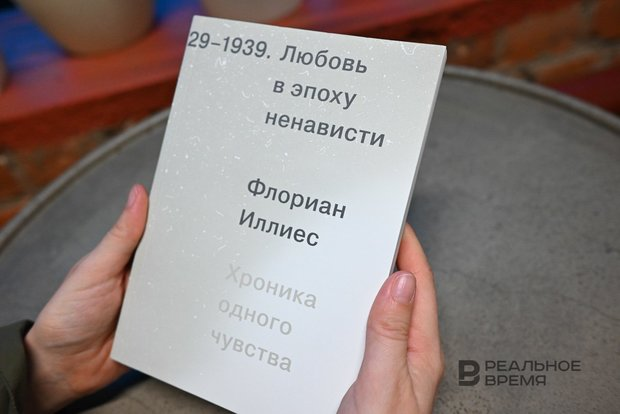Love intoxication as reaction to National Socialism
In the book ‘Love in a Time of Hate’ Florian Illies studies love relations on the eve of World War Two
The previous similar book of Florian Illies 1913 became a bestseller in his homeland in Germany and conquered readers from all over the world with its unusual form. The publicist created a polyphonic image of the era from small scenes with different main characters of that time. In the previous book, it was a year before the First World War. In the new book, Illies considers an entire decade, the 1930s.
In the unfinished novel The Man Without Qualities Robert Musil says that world history is at least a love story by half. This phrase accurately describes what Florian Illiest did. He talked about world history as love story and studied the era based on its main characters’ relations.
It is hard to define the book’s genre. It is something between fiction prose and accurately, detailed documentation of historical events and facts. Here as well as in 1913, the era is shown polyphonically, but the author covers a longer period and focuses only love affairs. The reader sees Jean-Paul Sartre and Simone de Beauvoir, essayist and poet Gottfried Benn with his wife, dramaturg Bertolt Brecht and all his female “cooperative,” the amazing Manns family, drug addict Francis Scott Fitzgerald and his wife Zelda suffering from schizophrenia. Hermann Hesse who endlessly pulls weeds out and his unloved wife Ninon are with them too. They all love, suffer and miss each other in love triangles, squares and other polygons.
Bertolt Brecht marries Helene Weigel, and after the wedding he runs to the station to meet his lover. Jean-Paul Sartre signs a pact on free love with Simone de Beauvoir. Henry Miller suffers from his spouse June’s new love. Now their family bed is occupied by another man, while he has to carry his pillows to the couch.

Love in a Time of Hate starts with the sunset of “golden 20s” in Germany. Nazis didn’t come to power yet. But the world economic crisis and the nation’s desperation led to a situation in which National Socialism is nearing as thunder cloud. The feeling of something inevitably terrible is already in the air. This “something” will lead cultural heroes of the Weimar period to expulsion or death.
The narration in the book follows the chronology of events. But the structure is extraordinary. 1933 is at the centre when Hitler and his party came to power, when a fire broke out in Reichstag, when books were burnt. He divided the periods “before” and “after.” But through all three parts, we travel with the intellectual bohemians that got entangles in sexual affairs and erotic experiments.
Berlin was initially chosen as the central scene of the action. But after the Nazi regime came, most main characters end up in expulsion. The Manns family lives in southern France, German philosopher Walter Benjamin moves to Ibiza, Kurt Tucholsky dies in Scandinavia, while Marlene Dietrich conquers Hollywood. Only Gottfried Benn who sympathised with Nazis only at the beginning and writer Erich Kästner didn’t want to leave his mother and who saw his books being burnt at the Bebelplatz on 10 May 1933 stayed in the capital of Germany.

Perhaps, Klaus Mann, Thomas Mann’s son, gradually becomes the brightest figure of the book. He refuses to live with his parents because of uneasy relations with his father preferring hotel rooms. He is almost homeless who notes that the next check-in at the hotel is the 1,200th. Klaus Mann personifies the era of expulsion in his desperate drug addiction, confrontation with Gottfried Benn and his anti-fascist stance like nobody else.
The chronicles of Illies is somewhat similar to voyeurism, but at the same time it is didactic, intelligent and written with irony. Love in a Time of Hate is a captivating, funny and tragic book where celebrities are shown in their everyday life. Almost all of them without exception are enmeshed in unrequited love. They don’t look like cultural geniuses, they seem sufferers.
“All happy couples are alike, but every unhappy couple is unhappy in its own way,” Illies rephrased this Tolstoy’s famous quote. But he is cunning because the book anyway has at least four people who found their love. It is philosophers Hannah Arendt and Heinrich Blücher and publisher Kurt Wolff and his spouse Helen Mosel.
Publisher: Ad Marginem
Translation: Vitaly Serov
Pages: 384
Year: 2022
Reference
Ekaterina Petrova is the founder of Makulatura book club and author of Poppy Seed Muffins telegram channel.